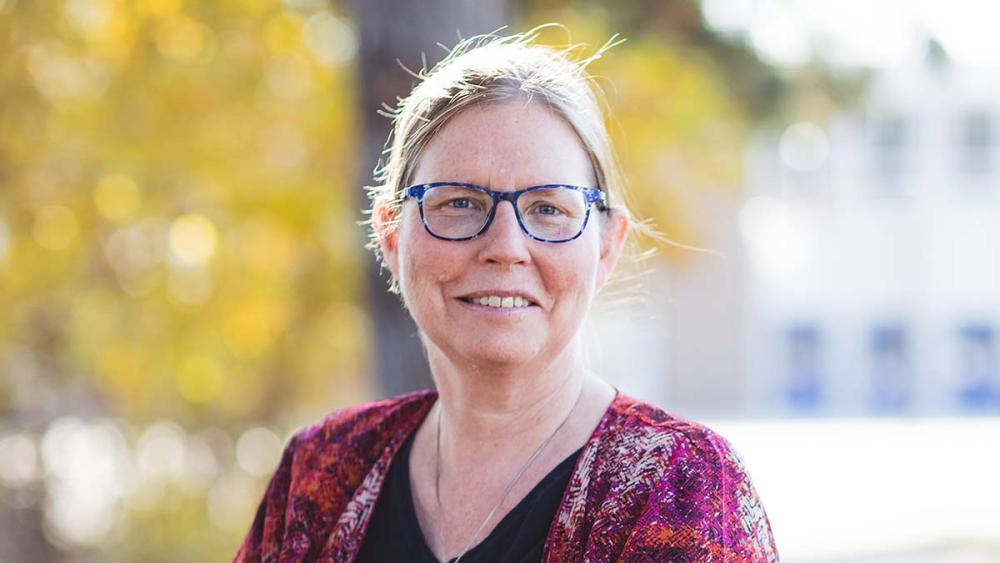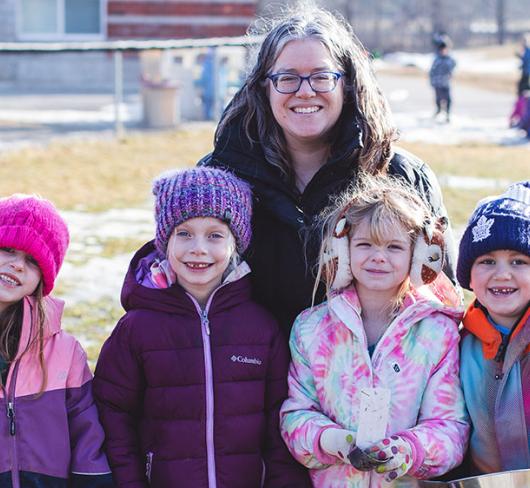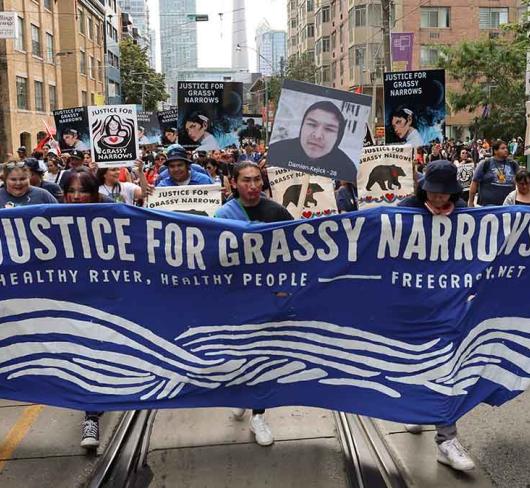
Solidarity by Design
Solidarity, the idea that unity can be created when people with common interests work together, is essential to the union movement. It is a powerful experience that is at the heart of people showing up at their collective best. We need more solidarity in our fractured world, but how to go about building it can seem unclear, or even confusing.
After successfully starting a climate justice committee in my local, I want to share how important and meaningful this solidarity work has been and how other ETFO members have done the same on issues that are important to all of us. This article shares the stories of three teachers (including me) who organized at the local level in very different ways and on unique issues, but with the same outcome: The creation of community and solidarity.
Making Space for 2SLGBTQ+ Issues
The opportunity to provide support for 2SLGBTQ+ members was one that resonated with Rico Rodriguez, who is currently an executive member of the Elementary Teachers of Toronto (ETT). “It can be very lonely to be the only queer person at a school,” Rico reflects. “It is important to have allies and like-minded people for support.”
Rico has a diverse teaching background, having worked as a counsellor supporting street youth before moving to the elementary panel in 2005. He has worked as a guidance counsellor, as a teacher and in an intensive support program for students with specific needs.
With his move to ETFO, Rico became active in the Elementary Teachers of Toronto as a steward and through the local’s Anti-Racism, Equity and Social Justice committee (ARESJ). There were some queer teachers involved with the committee, but they felt like their issues weren’t a priority. At the time, there was little that was affirming for students in school libraries and a general hesitancy about advocating for 2SLGBTQ+ issues.
Frustrated with a feeling of gradualism in the local, a group of activists led by a queer executive officer decided they needed their own committee for 2SLGBTQ+ members and allies. The ETT executive requested that they demonstrate a need for the committee.
Unfortunately, homophobia continued (and continues) to be present in Canada and throughout the world. According to Statistics Canada, 2SLGBTQ+ students are bullied at a higher rate than their heterosexual and cisgender counterparts at school and are more likely to experience homelessness. Regardless of age, 2SLGBTQ+ people earn lower incomes, experience discrimination on the job, encounter barriers in finding and advancing in employment, and are more likely to experience acts of violence.
At the 2010 ETT annual constitutional meeting, organizing and bringing out people to support the creation of the 2SLGBTQ+ committee was essential. Rico even brought people in his car. The importance of and need for the committee was presented, but there was demonstrated resistance, as it was argued that the ARESJ committee already represented queer members. Fortunately, the question passed when it was called, albeit with a number of abstentions.
Over the years, the ETT’s 2SLGBTQ+ committee has played an essential role in fighting for safe spaces for queer teachers and students. They have organized conferences and workshops, poster competitions and distribute queer-themed books to libraries and teachers. There continues to be a need for the committee as “homophobia, transphobia, biphobia and lesbophobia are alive and well,” says Rico. He notes that COVID was challenging and queer teachers were isolated. The culture wars of the past few years have been difficult as educators have encountered anti-2SLGBTQ+ protests and online hate, creating a chilling effect on queer activists.
Rico offers this advice for starting a committee that is important not only to you but to our public schools: “Be relentless and find your allies. The need exists and while it’s about us, it is also about our students. Don’t forget to have fun and enjoy how activism can bring people together.”
Addressing Disability Issues
Kim Brown is a deaf educator who sees the value of committees and how they can be a place for educators to discuss issues and advocate for themselves. Born deaf, Kim had to adapt as a child to a hearing world. She was mainstreamed in the public education system, supported with a Frequency Modulation system and priority seating and relies on lip reading for further support. She currently works for the Upper Canada District School Board as an occasional teacher.
For Kim, ETFO has been a critical place to develop her leadership and advocacy skills. As a deaf person, phone calls from the board (“call outs”) for occasional teacher work were, not surprisingly, difficult and stressful. From 2002 to 2020, instead of teaching, she held various data entry positions and continued to struggle. Despite being a strong advocate for herself in the rest of her life, Kim was unaware of the accommodations that were available to her in the workplace.
When she returned to teaching in the fall of 2020, the SmartFind app allowed her to receive call outs in an accessible way. With other accommodations in her workplace and support from her local union, her principal and an audiologist, Kim has been able to successfully return to the classroom.
Inspired by these experiences, Kim is considering developing a local committee for people with disabilities, which would serve to support members becoming stronger advocates for themselves and others. She sees the value of advocacy and the benefits of working with other educators who need different supports and accommodations to do their jobs.
A local committee could also bring attention to the various disability awareness days, weeks and months (for example, the last week of September is the International Week of the Deaf). There is also the potential to organize workshops with the permanent teacher local on advocacy and disability rights. Advocacy, conversation and organizing help build relationships and create networks of support and solidarity within ETFO.
Climate Justice and Sustainability
I have always been interested in and aware of environmental issues, and once I became a teacher I regularly incorporated outdoor education into my program. It is not surprising that when I became involved with the ETFO Halton Teacher Local, climate change was the issue that I embraced.
Part of my journey as both an environmental and a union activist has been to connect the issue of climate change to the union movement. I see the power of community and solidarity and have a deep appreciation for what unions have accomplished. In 2018, I took on the chair role of the Political Action Committee in my local and started to incorporate the issue of climate change into what we did.
Our efforts to organize a workshop about climate change for educators were delayed by COVID, but we offered a half-day virtual workshop in 2021 and a full-day in-person workshop in 2022. These were both well-attended and well-received, with energy and excitement about climate change education and environmental activism.
With extreme weather (heat domes, wildfires, floods, droughts) observed throughout the world, and continued calls to action on the climate, creating a committee that focused on the climate crisis felt important.
I approached the executive of our local to see if we could organize an ad hoc climate justice and sustainability committee and our request was supported by ETFO Halton local leadership. At our workshops and events, we sent around a sign-up sheet or provided an electronic form that asked people to join our committee. We also developed a group of supporters who are interested in the work and might come out to events, but who don’t want to formally join the committee (yet).
At Halton’s most recent annual general meeting, our ad hoc group became a permanent standing committee. Currently, we have 12 active members. We continue to organize events and are optimistic about the impact we can make in the fight against climate change. We have developed resolutions for ETFO’s Annual Meeting (one of our resolutions passed in 2024) and hope to develop a network of unionists throughout Ontario who are empowered to organize around environmental issues.
Organizing Creates Solidarity
Organizing a new committee can be complicated and a bit nerve-wracking, but the payoff is worth it. The energy created by working collectively can be infectious. The more people see and hear about the important issues that committees work on, the more likely it is they will get involved, and things just grow from there.
Tips for Forming a Committee in Your Local:
- Relationships: Connect with people who have similar interests or needs. Starting a committee with one or two other people is very helpful for sharing ideas and strategies.
- Leadership: Include your local leadership and executive in your ideas. Asking your executive to create an ad hoc committee for a year is a good first step.
- Organize: Ask people to become involved in your committee: send a sign-up sheet around at a workshop, share your thoughts with others at union meetings, chat with colleagues at work.
- Resources: Think creatively about opportunities to liaise with community groups, but also use resources and supports already in place. ETFO’s easily accessible Presenters on the Road workshops or meet-and-greets at the local office can be very simple events with big impact.
- Take risks: Sometimes unexpected barriers arise, and mistakes are made. That’s OK – paying attention to what occurs and adjusting accordingly is important.
- Have fun: Creating a new committee is both exciting and empowering. Envision the committee you want to see and then take the steps to develop it.
Jen Reid is a member of the Halton Teacher Local.

